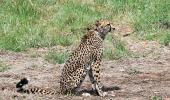The eight cheetahs from Namibia, who were released into Madhya Pradesh's Kuno National Park on Saturday, seemed to be slowly adapting to the new environment as they were seen strolling in their quarantine enclosure on Sunday and soaking in the ambience with curiosity.

Prime Minister Narendra Modi on Saturday released these cheetahs brought from the African country into a quarantine enclosure at the KNP in Sheopur district as part of a project to revive the population of the animal which became extinct in India in 1952.
At the time of their release, the spotted big cats looked hesitant as they took in the new environment with a look of curiosity mixed with bafflement.
As the door of its cage slid open, the first of the eight cheetahs hesitated for a moment or two before stepping out onto the grass.
It then ran, came to a halt near a tree and scanned the surroundings, its new home 8000 km away from its native Namibia, by turning the neck in every direction.
But the initial hesitation appeared to be fading on their second day in the new country.
All the eight cheetahs -- five female and three male, named Obaan, Freddy, Savannah, Asha, Cibili, Saisa and Sasha -- looked fit and fine and drank water kept at their quarantine enclosure in the KNP on Sunday.
They were seen wandering and resting in their new habitat.
These fastest land animals were seen looking around the new surroundings.
The new guests are still observing the unfamiliar surroundings with inquisitive minds, said the people keeping a tab on their movements.
Veterinarians and experts from India and Namibia are keeping a close watch on these spotted animals in their quarantine enclosure, where they will be kept for a month.
They will be given buffalo meat to feast on during this period.
These animals are believed to take food once in three days. They were given buffalo meat before they left Namibia for India two days ago, KNP director Uttam Sharma told PTI.
"So they will be given food today," he added.
The cheetahs are active and in good health, Sharma said.
"We have not given new names to them. Right now we are not thinking over it. They were given names in Namibia," the director said.
The transcontinental journey of more than 8,000 km of the eight cheetahs aged between 30 to 66 months from Namibia had begun on Friday night.
Around 11.30 am, as the prime minister operated a lever from the high dais, the sliding door of the special cage below opened, and the first of the cheetahs stepped into the special enclosure at the KNP.
Earlier that day, a modified Boeing 747 carrying these cheetahs landed at the Gwalior airbase.
The animals were then flown by two Indian Air Force helicopters to Palpur near the Park, 165 km away.
The last cheetah died in the country in 1947 in Korea district in present-day Chhattisgarh, earlier part of Madhya Pradesh, and the species was declared extinct from India in 1952.
While the 'African Cheetah Introduction Project in India' was conceived in 2009 during the rule of the United Progressive Alliance, the plan to bring the big cat to the KNP by November last year suffered a setback due to the COVID-19 pandemic.
In his speech after releasing cheetahs, PM Modi had on Saturday cautioned that they need time to get used to their new surroundings before people can see them in the wild.
"Cheetahs are our guests; we should give them a few months to make Kuno National Park their home," he said.
The KNP, spread over an area of 750 sq km, is situated on the northern side of Vindhyachal mountains.
It derives its name from the Kuno river, a tributary of the Chambal.










